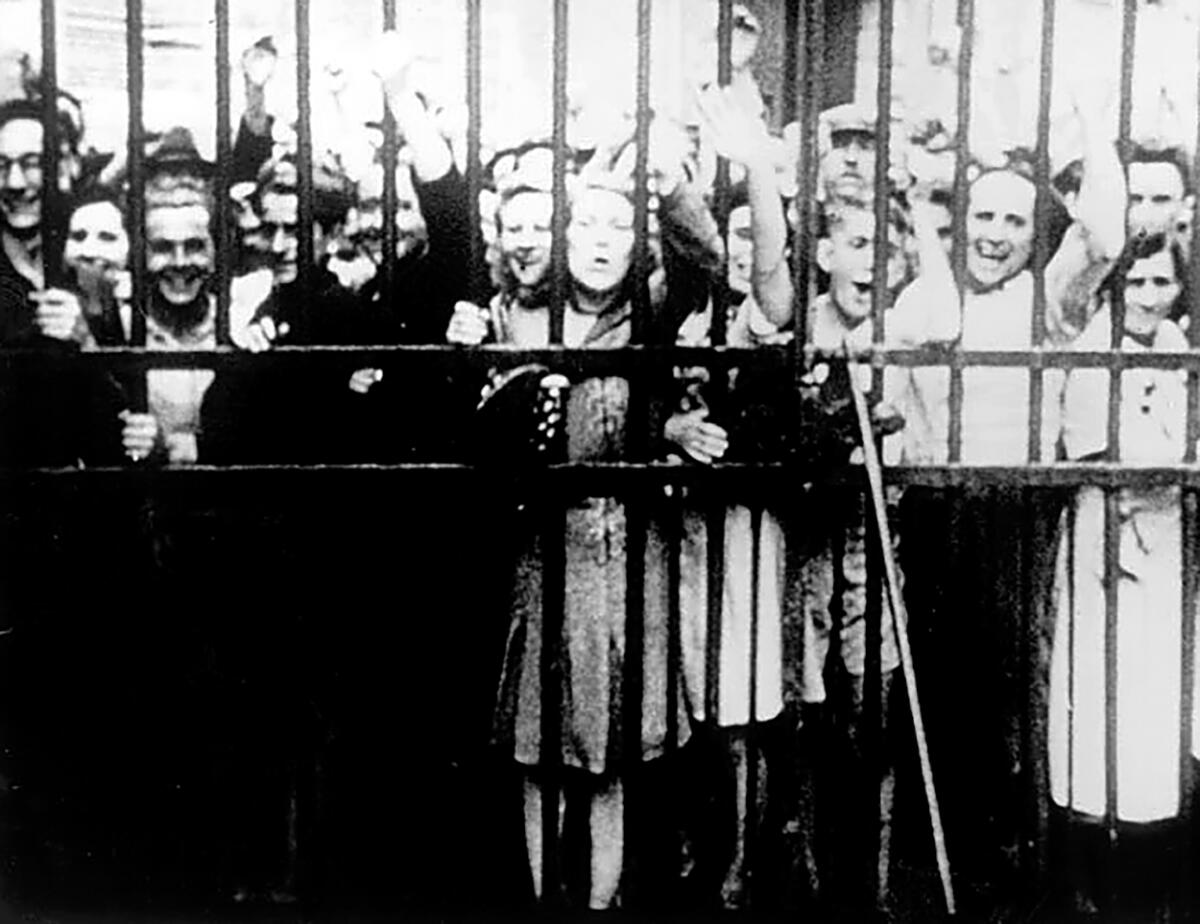Marcel Ophuls, L.A.-raised documentarian and Oscar winner, dies
Renowned documentary filmmaker Marcel Ophuls, who, along with his family, fled Nazi Germany as a child and spent his formative years in Los Angeles before having a cinematic career which earned him both an Oscar as well as condemnation from some quarters, died Saturday in France, his adopted country. He was 97.
Ophuls’ death, first reported by news agencies, was confirmed by family members. He is survived by his wife, Regine, their three daughters and three grandchildren.
The director’s 1969 masterpiece, “The Sorrow and the Pity,” an intense, four-hour work that made Ophuls’ reputation, began as a project for a government-owned French broadcast network. Ultimately, though, it was banned and did not air on television until many years later, due to its searing indictment (or “explosion,” as Ophuls preferred to called it) of the myth of France’s heroic participation in the war — a false if popular version of events that ignored Vichy collaboration with the German occupiers.
Born in Frankfurt in 1927, Ophuls was the son of film director Max Ophüls (his father later dropped the umlaut) and Hildegard Wall, a theater actor. When the Nazis came to power in 1933, the Ophuls clan left Germany for Paris. Then, when France fell, they settled in Los Angeles in November 1941, where Max Ophuls would come to enjoy a significant moviemaking career (“Letter from an Unknown Woman”).

Citizens celebrate the liberation of France in Ophuls’ 1969 documentary “The Sorrow and the Pity.”
(Laemmle)
For young Marcel — German Jewish, a citizen of both France and the United States and fluent in three languages —the ethos and landscape of Southern California posed a very different and sometimes alienating experience.
After graduating from Hollywood High, he was drafted by the U.S. Army and later enrolled at Occidental College in Eagle Rock, but still found assimilation difficult, revealing to writer Studs Terkel in a 1981 interview that, even as a refugee, he was shocked by the prejudice he observed toward people of color in the divided communities of Los Angeles following Pearl Harbor.
“When I made movies,” he said, “one of the things that kept me from being too self-righteous is my memory of the Japanese kids who were in my class one day, then gone the next.”
While his father Max struggled at first to find work in Hollywood, Marcel felt destined, as he often said, for a career in the film industry. As he revealed in his 2013 documentary memoir “Ain’t Misbehavin,” he began his career as an actor, playing, ironically, a member of the Hitler Youth in Frank Capra’s 1942 War Department film “Prelude to War.”
Ultimately following his father to France in 1950, Ophuls turned to making nonfiction films for French television, after trying his hand in narrative cinema.
“My second film flopped, but it was a very bad film that deserved to flop,” he said frankly, speaking about his career in London in 2004.
His self-deprecating brand of humor, tinged with a touch of irony, was often apparent in the interviews he conducted for many of his films, confronting former Nazis and collaborators. Alternately, his tone was infused with contempt, sarcasm or genuine sympathy for his subjects who had been victims of brutality unleashed by the Gestapo or secret police of the Vichy regime.
Ophuls won the Academy Award for documentary feature in 1989 for “Hotel Terminus: The Life and Times of Klaus Barbie,” which depicted the crimes of the head of the Gestapo in Lyon who, after the war, escaped French prosecutors with the help of U.S. Army intelligence, evading justice and living in South America until he was extradited to France from Bolivia in 1983. Barbie died in prison in 1991.
Ophuls was also known for other documentaries, including 1976’s “The Memory of Justice,” about the legacy of the Nuremberg trials, and 1972’s “A Sense of Loss,” which dealt with the troubles of Northern Ireland.
About his famous confidence when seated face-to-face with intimidating subjects — one interview was with Albert Speer, Hitler’s chief architect and minister of armaments — Ophuls was characteristically candid and self-effacing.
“He was so fantastically cooperative,” he said of Speer. “He even offered to show me his home movies. It just seemed to me to be part of my job.”

